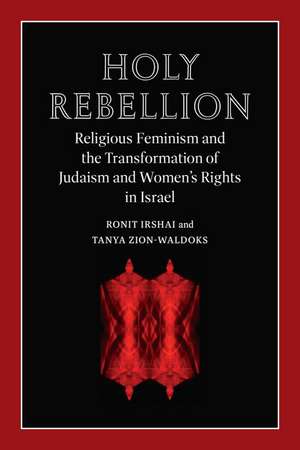Holy Rebellion – Religious Feminism and the Transformation of Judaism and Women`s Rights in Israel: Brandeis Series on Gender, Culture, Religion, and Law
Autor Ronit Irshai, Tanya Zion–waldoksen Limba Engleză Paperback – 4 iun 2024
In Holy Rebellion, Ronit Irshai and Tanya Zion-Waldoks examine social change in Israel through a rigorous analysis of the shifting entanglements of religion, gender, and law in times of cultural transformation. They explore theological, halakhic, political, and sociological processes and show how they interact with one another in ways that advance women’s rights, as well as how they are met with a conservative backlash in the discourses and actions of the rabbinic establishment. Irshai and Zion-Waldoks build on legal philosopher Robert Cover’s 1982 paper “Nomos and Narrative,” which explained how cultural narratives and legal norms are reciprocally enforced or transformed. Expanding on this notion, Irshai and Zion-Waldoks propose a “narrative ripeness test,” an analytic tool that evaluates the relationship between culture and law to assess how and when change within a minority cultural community may be accelerated or hindered by state intervention.
Religious feminisms are emerging around the world, not solely in Israel, and this book helps elucidate how they create enduring and radical change. Many liberal states are also confronting an illiberal backlash and question the multicultural framework’s ability to serve the needs of minorities within minorities. Therefore, the theoretical framework offered by Irshai and Zion-Waldoks is applicable beyond the Israeli case, even as it offers deeper insights into an Israeli society in turmoil.
Preț: 271.29 lei
Nou
Puncte Express: 407
Preț estimativ în valută:
51.92€ • 54.77$ • 43.27£
51.92€ • 54.77$ • 43.27£
Carte disponibilă
Livrare economică 12-26 decembrie
Livrare express 28 noiembrie-04 decembrie pentru 43.13 lei
Preluare comenzi: 021 569.72.76
Specificații
ISBN-13: 9781684582099
ISBN-10: 1684582091
Pagini: 378
Dimensiuni: 152 x 228 x 31 mm
Greutate: 0.64 kg
Editura: Brandeis University Press
Seria Brandeis Series on Gender, Culture, Religion, and Law
ISBN-10: 1684582091
Pagini: 378
Dimensiuni: 152 x 228 x 31 mm
Greutate: 0.64 kg
Editura: Brandeis University Press
Seria Brandeis Series on Gender, Culture, Religion, and Law
Notă biografică
Ronit Irshai is associate professor and the head of the Gender Studies Program at Bar Ilan University, and a research fellow at the Shalom Hartman Institute in Jerusalem. Tanya Zion-Waldoks is assistant professor in the Seymour Fox School of Education at the Hebrew University in Jerusalem.
Cuprins
PREFACE The heroines of this story Authors’ positionality and Methodology INTRODUCTION Who and what is this book about?A note on terminology
The Dati (Jewish National-Religious/Modern Orthodox) community in Israel Dati feminists – Who are they? Gender, religion, and the Jewish-democratic State Overview of the book and its main argument
CHAPTER 1: JEWISH FEMINIST CRITIQUES OF RELIGIOUS NARRATIVE AND NOMOS Theoretical frameworks Applying Cover CHAPTER 2: HOMES - FEMINISM RESHAPES ORTHODOX JUDAISM
Strategies of “Change from Within” and Struggles over Collective Homes Beit Midrash (Torah Study)
Beit Knesset (Religious Rituals) Beit Din (Adjudication: Agunot and get Refusal) Bayit Leumi (National Home) Bayit Yehudi (Jewish Family and Female Body) Postscipt: Alternative Homes CHAPTER 3: NARRATIVE BACKLASH: THEOLOGICAL, DISCURSIVE AND POLITICAL ORTHODOX OBSTACLES TO DATI FEMINISM
The Sacrificial Imperative: “Aqedah” Theology as the Basis for Religious Subjectivity“Gender Essentialism” “Slippery Slope” Nationalism “Normalcy” and Family Values
CHAPTER 4: JUDICIAL ENCOUNTERS BETWEEN DATI FEMINISTS AND THE STATE Introduction “Minority within minority”: Unpacking the Multi-culturalism DebatesA New Theoretical Model: The “Narrative Ripeness” Test
The Human Dignity Test: The Limits of “Narrative Ripeness” Dati Feminists and Israel’s Supreme Court: Applying the Narrative Ripeness Test .
Acute Cases: Human Dignity Supercedes Narrative Ripeness AFTERWORD Viva la revolución? Our argument Where do we go next? Looking to the future
The Dati (Jewish National-Religious/Modern Orthodox) community in Israel Dati feminists – Who are they? Gender, religion, and the Jewish-democratic State Overview of the book and its main argument
CHAPTER 1: JEWISH FEMINIST CRITIQUES OF RELIGIOUS NARRATIVE AND NOMOS Theoretical frameworks Applying Cover CHAPTER 2: HOMES - FEMINISM RESHAPES ORTHODOX JUDAISM
Strategies of “Change from Within” and Struggles over Collective Homes Beit Midrash (Torah Study)
Beit Knesset (Religious Rituals) Beit Din (Adjudication: Agunot and get Refusal) Bayit Leumi (National Home) Bayit Yehudi (Jewish Family and Female Body) Postscipt: Alternative Homes CHAPTER 3: NARRATIVE BACKLASH: THEOLOGICAL, DISCURSIVE AND POLITICAL ORTHODOX OBSTACLES TO DATI FEMINISM
The Sacrificial Imperative: “Aqedah” Theology as the Basis for Religious Subjectivity“Gender Essentialism” “Slippery Slope” Nationalism “Normalcy” and Family Values
CHAPTER 4: JUDICIAL ENCOUNTERS BETWEEN DATI FEMINISTS AND THE STATE Introduction “Minority within minority”: Unpacking the Multi-culturalism DebatesA New Theoretical Model: The “Narrative Ripeness” Test
The Human Dignity Test: The Limits of “Narrative Ripeness” Dati Feminists and Israel’s Supreme Court: Applying the Narrative Ripeness Test .
Acute Cases: Human Dignity Supercedes Narrative Ripeness AFTERWORD Viva la revolución? Our argument Where do we go next? Looking to the future
Recenzii
“A must-read for anyone seeking the most comprehensive account of the development of religious feminism in Israel to date. The unique combination of theoretical and sociological analysis leads to incisive analysis of the broader cultural, legal, social, and political implications of this phenomenon. An invaluable case study of possible modes of interaction between conservativism and radical change.”
“Holy Rebellion combines a compelling narrative with methodological rigor in this fascinating account of the impact of feminism on Israeli Orthodoxy.”
“Holy Rebellion will become a classic in the field of religious feminist literature. This highly readable volume is the most comprehensive and rigorous analysis imaginable, from private observance of niddah to public rabbinic ordination of women to the implications the backlash holds for the very future of religion in Israel.”

